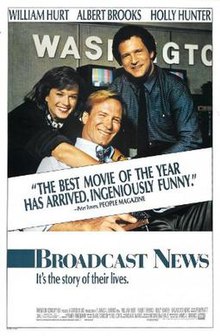
The American Film Institute (AFI) is an American nonprofit film organization that educates filmmakers and honors the heritage of the motion picture arts in the United States. AFI is supported by private funding and public membership fees.
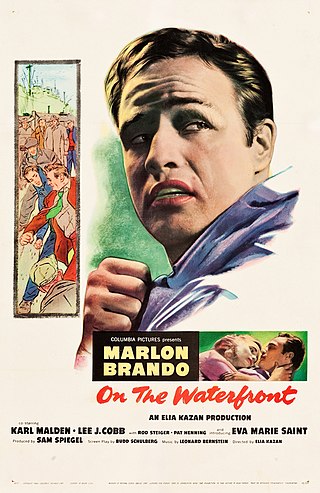
On the Waterfront is a 1954 American crime drama film, directed by Elia Kazan and written by Budd Schulberg. It stars Marlon Brando, and features Karl Malden, Lee J. Cobb, Rod Steiger, Pat Henning and Eva Marie Saint in her film debut. The musical score was composed by Leonard Bernstein. The black-and-white film was inspired by "Crime on the Waterfront" by Malcolm Johnson, a series of articles published in November–December 1948 in the New York Sun which won the 1949 Pulitzer Prize for Local Reporting, but the screenplay by Budd Schulberg is directly based on his own original story. The film focuses on union violence and corruption among longshoremen, while detailing widespread corruption, extortion, and racketeering on the waterfronts of Hoboken, New Jersey.
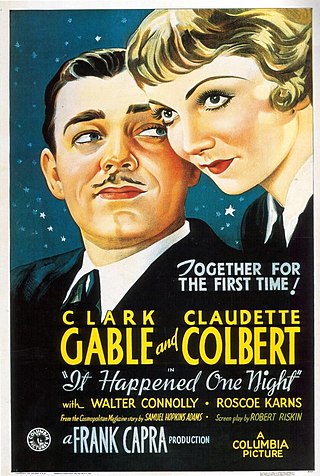
It Happened One Night is a 1934 American pre-Code romantic comedy film with elements of screwball comedy directed and co-produced by Frank Capra, in collaboration with Harry Cohn, in which a pampered socialite tries to get out from under her father's thumb and falls in love with a roguish reporter. The screenplay by Robert Riskin is based on the August 1933 short story "Night Bus" by Samuel Hopkins Adams, which provided the shooting title. Classified as a "pre-Code" production, the film is among the last romantic comedies created before the MPPDA began rigidly enforcing the 1930 Motion Picture Production Code in July 1934. It Happened One Night was released just four months prior to that enforcement.
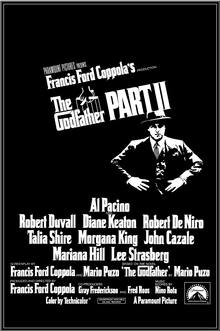
The Godfather Part II is a 1974 American epic crime film. The film is produced and directed by Francis Ford Coppola, loosely based on the 1969 novel The Godfather by Mario Puzo, who co-wrote the screenplay with Coppola. It is both a sequel and a prequel to the 1972 film The Godfather, presenting parallel dramas: one picks up the 1958 story of Michael Corleone, the new Don of the Corleone family, protecting the family business in the aftermath of an attempt on his life; the prequel covers the journey of his father, Vito Corleone, from his Sicilian childhood to the founding of his family enterprise in New York City. The ensemble cast also features Robert Duvall, Diane Keaton, Talia Shire, Morgana King, John Cazale, Mariana Hill, and Lee Strasberg.
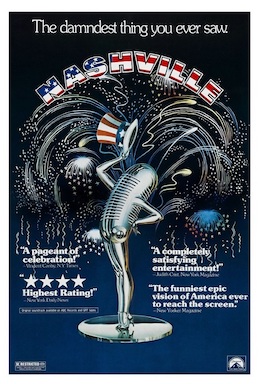
Nashville is a 1975 American satirical musical comedy-drama film directed and produced by Robert Altman. The film follows various people involved in the country and gospel music industry in Nashville, Tennessee, over the five-day period leading up to a gala concert for a populist outsider running for president on the Replacement Party ticket.

Network is a 1976 American satirical black comedy-drama film directed by Sidney Lumet and written by Paddy Chayefsky. It is about a fictional television network and its struggle with poor ratings. The film stars Faye Dunaway, William Holden, Peter Finch, Robert Duvall, Wesley Addy, Ned Beatty, and Beatrice Straight.
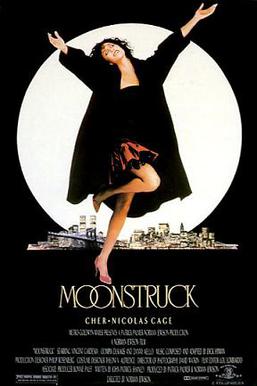
Moonstruck is a 1987 American romantic comedy film directed by Norman Jewison and written by John Patrick Shanley. It stars Cher as a widowed Italian American woman who falls in love with her fiancé's hot-tempered, estranged younger brother, played by Nicolas Cage. The supporting cast includes Danny Aiello, Olympia Dukakis and Vincent Gardenia.

The Piano is a 1993 historical drama film written and directed by Jane Campion. It stars Holly Hunter, Harvey Keitel, Sam Neill, and Anna Paquin in her first major acting role. The film focuses on a mute Scottish woman who travels to a remote part of New Zealand with her young daughter after her arranged marriage to a frontiersman.
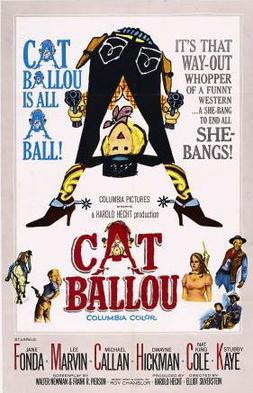
Cat Ballou is a 1965 American western comedy film starring Jane Fonda and Lee Marvin, who won an Academy Award for Best Actor for his dual role. The story involves a woman who hires a notorious gunman to protect her father's ranch, and later to avenge his murder, only to find that the gunman is not what she expected. The supporting cast features Tom Nardini, Michael Callan, Dwayne Hickman, and Nat King Cole and Stubby Kaye, who together perform the film's theme song, and who appear throughout the film in the form of travelling minstrels or troubadours as a kind of musical Greek chorus and framing device.

Janusz Zygmunt Kamiński is a Polish cinematographer and director of film and television. He has established a partnership with Steven Spielberg, working as a cinematographer on his films since 1993. He won the Academy Award for Best Cinematography for his work on Spielberg's holocaust drama Schindler's List and World War II epic Saving Private Ryan (1998). He has also received Academy Award nominations for Amistad (1997), The Diving Bell & the Butterfly (2007), War Horse (2011), Lincoln (2012), and West Side Story (2021). He has also received nominations for five BAFTA Awards, and six American Society of Cinematographers Awards.

James Lawrence Brooks is an American director, producer, screenwriter and co-founder of Gracie Films. He co-created the sitcoms The Mary Tyler Moore Show, Taxi, and The Simpsons and directed the films Terms of Endearment (1983), Broadcast News (1987), and As Good as It Gets (1997). He received numerous accolades including three Academy Awards, 21 Emmy Awards, and a Golden Globe Award.
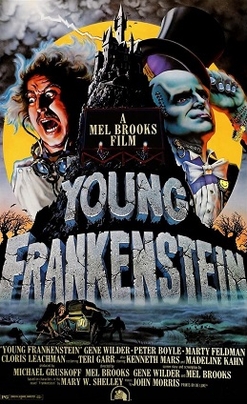
Young Frankenstein is a 1974 American comedy horror film directed by Mel Brooks. The screenplay was co-written by Brooks and Gene Wilder. Wilder also starred in the lead role as the title character, a descendant of the infamous Dr. Victor Frankenstein. Peter Boyle portrayed the monster. The film co-stars Teri Garr, Cloris Leachman, Marty Feldman, Madeline Kahn, Kenneth Mars, Richard Haydn, and Gene Hackman.

Primal Fear is a 1996 American legal mystery crime thriller film directed by Gregory Hoblit, based on the 1993 novel of the same name by William Diehl, and written by Steve Shagan and Ann Biderman. It stars Richard Gere, Laura Linney, John Mahoney, Alfre Woodard, Frances McDormand and Edward Norton in his film debut. The film follows a Chicago defense attorney who believes that his altar boy client is not guilty of murdering a Catholic archbishop.

How Green Was My Valley is a 1941 American drama film directed by John Ford, adapted by Philip Dunne from the 1939 novel of the same title by Richard Llewellyn. It stars Walter Pidgeon, Maureen O'Hara, Anna Lee, Donald Crisp, and a young Roddy McDowall.
The 53rd New York Film Critics Circle Awards honored the best filmmaking of 1987. The winners were announced on 17 December 1987 and the awards were given on 24 January 1988.

Holly Hunter is an American actress. Hunter won the Academy Award for Best Actress for her performance as Ada McGrath in the 1993 drama film The Piano. She earned three additional Academy Award nominations for Broadcast News (1987), The Firm (1993), and Thirteen (2003). She won two Primetime Emmy Awards for Outstanding Lead Actress in a Limited Series or Movie for the television films Roe vs. Wade (1989) and The Positively True Adventures of the Alleged Texas Cheerleader-Murdering Mom (1993). She also starred in the TNT drama series Saving Grace (2007–2010).

M*A*S*H is a 1970 American dark war comedy film directed by Robert Altman and written by Ring Lardner Jr., based on Richard Hooker's 1968 novel MASH: A Novel About Three Army Doctors. The picture is the only theatrically released feature film in the M*A*S*H franchise.

Susan Zirinsky is an American journalist and television news producer. She served as the President of CBS News from January 2019 until April 2021, when she was succeeded by Neeraj Khemlani and Wendy McMahon. She previously served as executive producer of 48 Hours from 1996 to 2019. In 2003, she won a Primetime Emmy Award as producer of the documentary 9/11, which aired on CBS in 2002.
